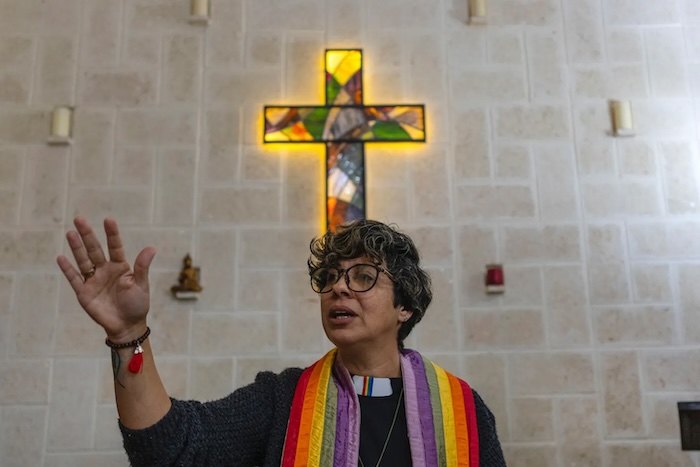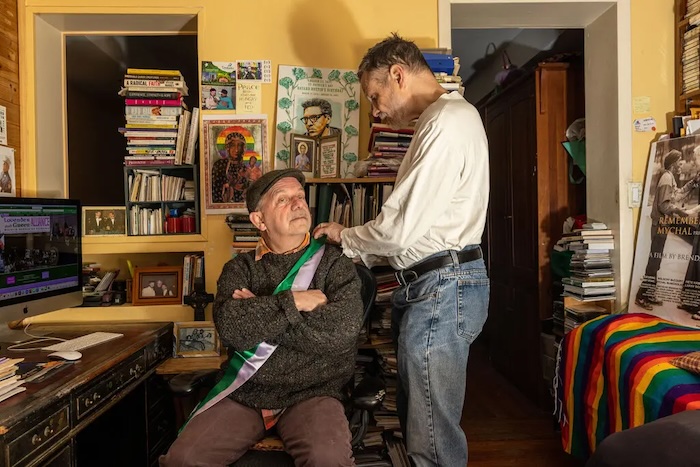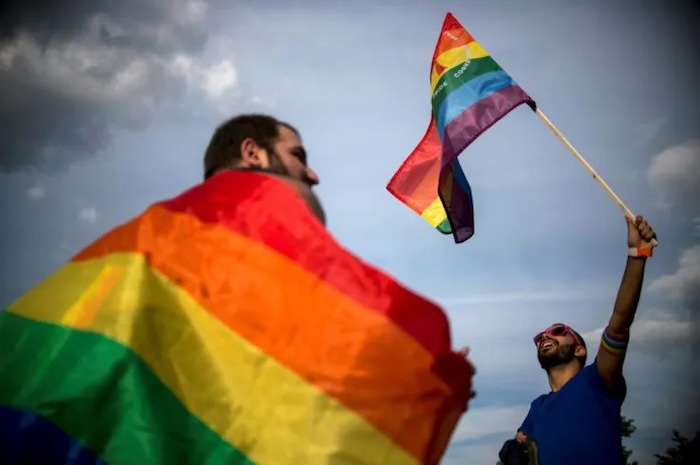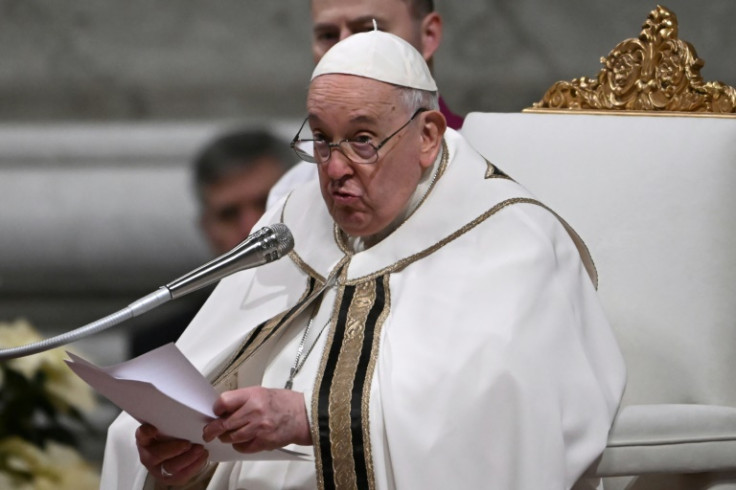
Proudly wearing a rainbow-colored clergy stole and a rainbow flag in her clerical collar, the Rev. Elaine Saralegui welcomed all to her LGBTQ+ inclusive church in the Cuban port city of Matanzas.
“We’re all invited. And no one can exclude us,” Saralegui told same-sex couples who held hands sitting on wooden pews in the Metropolitan Community Church where she had recently married her wife.
These words and this kind of gathering would have been unimaginable before in the largest country in the conservative and mostly Christian Caribbean, where anti-gay hostility is still widespread.
Cuba repressed gay people after its 1959 revolution led by Fidel Castro and sent many to labor camps. But in recent years, the communist-run island barred anti-gay discrimination, and a 2022 government-backed “family law” — approved by popular vote — allowed same-sex couples the right to marry and adopt.
Members of Cuba’s LGBTQ+ community say it marked a milestone that has allowed them to embrace their gender identity and worship more freely in a country that for decades after the revolution was officially atheist. Over the past quarter century, it has gradually become more tolerant of religions.
“It’s huge. There aren’t enough words to say what an opportunity it is to achieve the dream of so many,” said Maikol Añorga. He was with his husband, Vladimir Marin, near the altar, where at a Friday service they joined other congregants taking turns to lay offerings of white and pink wildflowers to thank God.
“It’s the opportunity for all people to be present here,” he said, “to gather and participate without regards to their gender, race or religion.”
The Catholic Church, in its doctrine, still rejects same-sex marriage and condemns any sexual relations between gay or lesbian partners as “intrinsically disordered.” Yet Pope Francis has done far more than any previous pope to make the church a more welcoming place for LGBTQ+ people.
In December, the pope formally approved letting Catholic priests bless same-sex couples, a policy shift that aimed at making the church more inclusive while maintaining its strict ban on gay marriage.
The family law in Cuba faced opposition from the country’s Catholic church as well as the growing number of evangelical churches that have mushroomed across the island.
Anti-LGBTQ+ rights demonstrations have faded since 2022. But back then, evangelical pastors spoke out from the pulpit, and handed out Bibles and pamphlets in the streets invoking God’s “original plan” for unions between men and women and calling gay relationships a sin.
Still, the measure was overwhelmingly approved by nearly 67% of voters. It came after a huge government campaign of nationwide informative meetings and extensive state media coverage amid food shortages and blackouts that have prompted thousands to immigrate to the United States during one of one of the worst economic crises to hit Cuba in decades.
At the time, President Miguel Díaz-Canel told Cubans in a video message that he was pleased about the wide support that the measure received despite tough economic challenges. He celebrated, tweeting: “Love is now the law.”
For years, the movement for LGBTQ+ rights has been proudly led by Cuba’s best-known advocate for gay rights: Mariela Castro, daughter of former President Raul Castro and niece of his brother Fidel.
“This just brings happiness. This just makes people feel truly worthy, respected, loved, considered – a true citizen with their rights and duties,” Castro told The Associated Press.
“I think we’ve taken a very valuable step forward.”
Long before same-sex couples were granted the right to marry, Castro was advocating for it, while training police on relations with the LGBTQ+ community and sponsoring symbolical ceremonies where Protestant clergy from the U.S. and Canada blessed unions as part of the annual Pride parade.
“It was a beautiful spiritual experience for me, and I believe for those people as well,” said Castro, who heads Cuba’s National Center for Sex Education and is a member of the National Assembly. “First, our campaign was: ‘Let love be the law.’ Now, love is the law, and we’re going to keep celebrating it.”
In 2010, her uncle, then- retired leader Fidel Castro admitted that he was wrong to discriminate against gay people. Asked about this, she said it helped mark a turning point in public attitude.
“I think he was honest. It was good and healthy for him to say this because it helped the rest who were still clinging to prejudices to understand that this kind of thought can change,” she said.
“Even in a revolutionary leader like him, there were prejudices that evolved, and he was able to understand it and help clear the way for change.”
In the early years after the 1959 revolution, homophobia in Cuba, she said, was no different than in the rest of the world. In the United States, homosexuality was deemed a mental disorder by psychiatric authorities, and gay sex was a crime in most states. Currently, Russia — a major supporter of Fidel Castro when it was the core of the communist Soviet Union — is bucking the worldwide trend of greater LGBTQ+ acceptance with a multi-pronged crackdown on LGBTQ+ activism.
The previous Cuban Family Code, dating back to 1975, stipulated that marriage was between a man and a woman – not between two people – which excluded lifelong partners from inheritance rights.
The new law goes further than marriage equality – which activists tried to include in the Constitution in 2019 without success – or the ability for gay couples to adopt or use surrogates. It also expanded rights for children, the elderly and women.
The first members of Saralegui’s congregation began gathering on a house terrace in Matanzas over a decade ago to sing and pray.
“The sky was our ceiling and when it rained, we’d all pack into a small room,” Saralegui said. In 2015, with support from the U.S.-based LGBTQ+ affirming Metropolitan Community Churches, they converted a house into their church, decked with wooden pews and a stained-glass cross that hangs above the altar. Underneath, a local Tibetan Buddhist group that meets here during the week stores its musical instruments in an example of interfaith partnership.
“This church is a family,” said Saralegui, who has a tattoo of the Jesus fish on one of her forearms and wears a Buddhist bracelet. “It’s a sacred space, not just because there’s a cross or an altar, but because it’s the most sacred space for these people to come to — it’s where they come to have a safe space.”
After receiving Communion, congregant Nico Salazar, 18, said he was glad to have found that safe space here after members of an evangelical church where he grew up attending asked him not to return when he embraced his gender identity.
“It’s the essence of the Bible: God is love, and other churches should emphasize that instead of repressing and harming others with a supposed sin,” said Salazar, who was born a woman and this year started hormone treatment.
“Sin and love are not the same,” said Salazar, who wore an earring in the shape of a cross.
“And to love,” he added, “is not a sin.”







